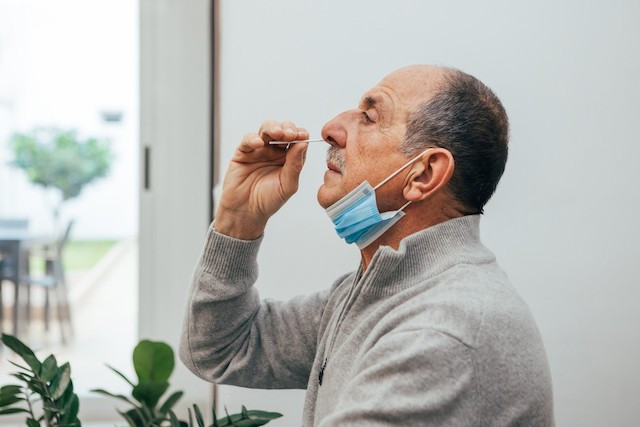The third phase of large-scale testing will be reinforced by the deployment of rapid antigen tests, the health minister announced on Thursday. They can be done at school, where a pilot project will start this month, but also in pharmacies, at home, even at a place of business.
How is it going to be organised? Jean-Paul Olinger, director of the Union des entreprises luxembourgeoises (UEL), says he is in discussions with the government on this subject. Will it fund a certain number of tests, in specific companies or sectors, or will each company have to provide them itself? "It’s still too early to tell," he says. The targeted sectors could be those "where there is a lot of contact", such as care and health, or generally where it is "not possible to use telework," he says. Regarding the pace, "we will need a global strategy."
Self-tests, but don’t forget vaccination
Olinger admits that rapid tests could help "increase security inside and outside companies", and therefore "open up the economy", while emphasising the importance, at the same time, of "speeding up vaccination" in the country. He is particularly in favour of the possibility of vaccinating in a company. Some employers say they are ready to organise this. As with the self-tests, the UEL is discussing the matter with the government.
"We can only be in favour of self-tests," says Romain Schmit, secretary general of the Fédération des artisans. "As long as they are there, they are reliable and that [people] know how to use them without a healthcare professional around." He adds that "more testing means a better view of how things are going." He also sees it as a way to decrease the wait for test results after quarantine, for example, reporting a high number of work stoppages.
There is high demand in several sectors in the craft industry. First, "the same as those who are most strongly interested in vaccination," he says, such as cleaning companies that work in hospitals or care establishments, or even funeral directors. But also "all those where we get closer to the customer"--for example, hair or beauty salons.
The secretary general of the federation is also keen to clarify: "The economy is ready to participate in whatever way it can", including vaccination, which he considers "suboptimal".
Construction could get ahead
"This is a very good thing to keep our employees safe and reassure returning customers," confirms François Koepp, general secretary of Horesca.
Nicolas Henckes, director of the Luxembourg Confederation of Commerce (CLC), is following the discussions coordinated by the UEL. “If we have tests and we have priority with certain sectors, as the CLC, we will promote this practice,” he says. If they are not funded by the government, "it will be up to the companies to decide, it will depend on the finances of each."
On the construction side, "it is obvious that we are extremely positive," comments Pol Faber, secretary general of the group of building and public works contractors. "We work as a team, so as soon as there is a positive person, the whole team has to go into quarantine."
Even if the tests are not funded by the government, "I think one or the other company will try to source the tests themselves," he says. Before that, some had already set up on-site PCR testing centres for their employees. If following this same logic, rapid tests should also be done on a voluntary basis.
This article was originally published in French on Paperjam.lu and has been translated and edited for Delano.
